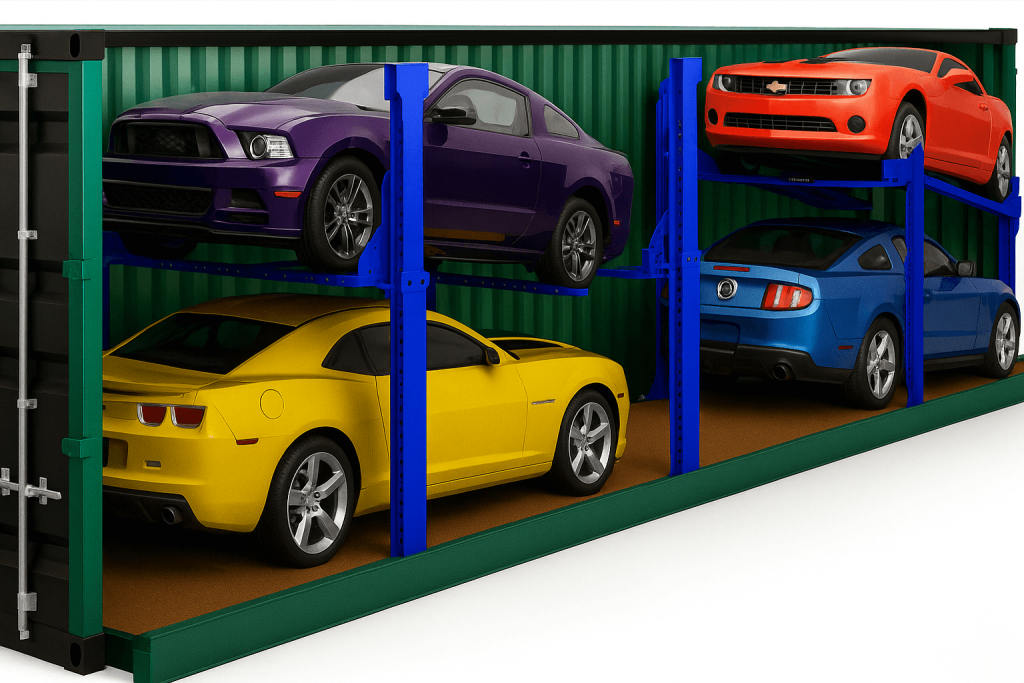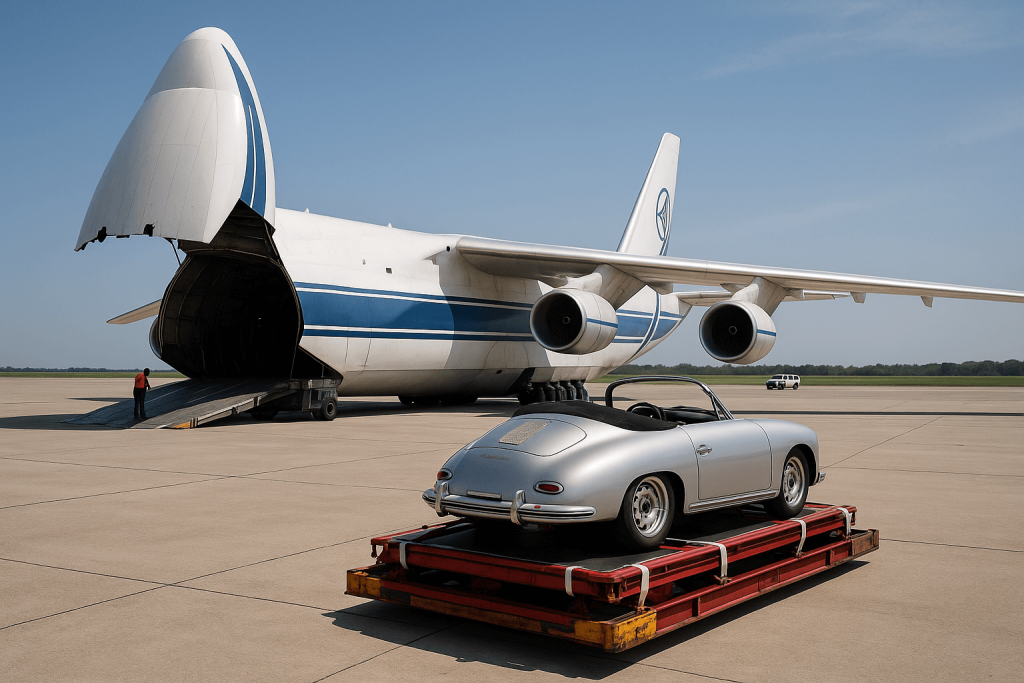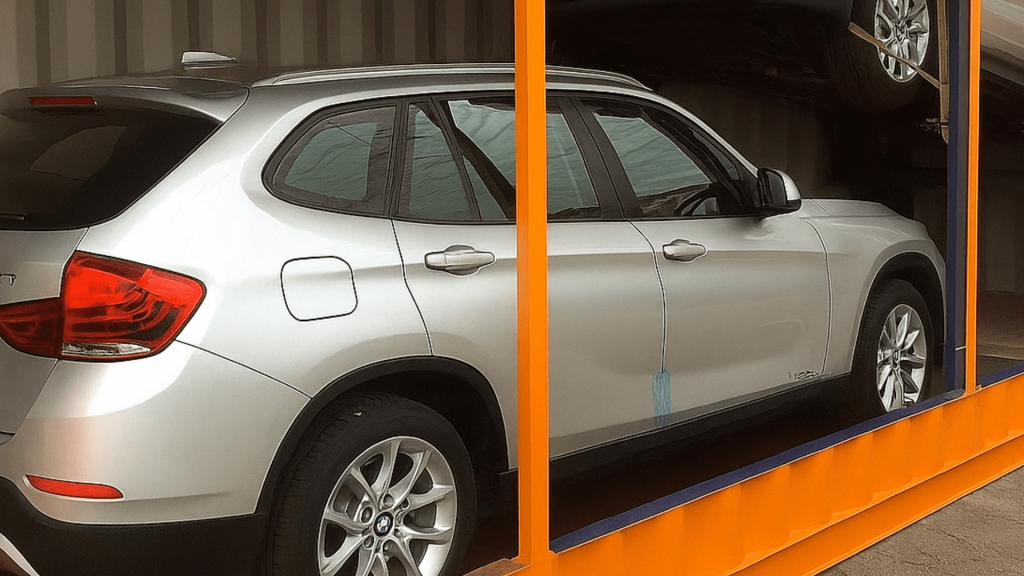Let’s face it, for Aussie businesses dipping their toes into the global market, getting your vehicles from A to B across the seas can feel like a bit of a maze. Seriously, whether you’re bringing in a shiny new fleet, sending out some specialist machinery, or even just moving company assets — it’s a big deal. Picking the right way to ship them makes a huge difference. It’s not just about the upfront cost. It’s also about how long it takes and, most importantly, keeping your valuable vehicles safe and sound.
This guide is designed to cut through the jargon and give you a straightforward look at the main ways of international car shipping. We’ll break down the good bits, and the things you need to think about, all from an Australian business perspective. Ultimately, our goal is to help you make smart choices for your global logistics. Plus, we’ll even flag some crucial Australian-specific requirements that often catch businesses by surprise.

Container Shipping
When it comes to safeguarding your valuable vehicles during their international journey, container shipping is often the go-to choice. Essentially, this method involves securely tucking your vehicle into robust steel shipping containers for their trip across the ocean. There are two main options here, and picking the right one really depends on your specific needs.
First off, there’s Full Container Load (FCL). Think of this as having your very own private shipping box. Your vehicle (or perhaps a few of them, if they fit) gets the whole container to itself. This is fantastic for maximum security and peace of mind.
On the other hand, we have Less than Container Load (LCL). With LCL, your vehicle shares container space with other cargo. To make the most of every inch, freight companies often use clever racking systems. Imagine something like the R-Rak, which helps stack vehicles efficiently.
Ultimately, no matter which option you choose, container shipping offers top-notch protection from the elements and potential damage. So it’s a seriously robust choice for Australian businesses that prioritise security above all else.
Why Container Shipping is a Smart Move for international car shipping:
- Unmatched Security & Protection: Firstly, for high-value assets like classic cars, delicate prototypes, or even just your everyday fleet vehicles — security matters. So container shipping offers the gold standard in protection from both theft and weather. This is especially crucial when you consider Australia’s incredibly diverse climate and sometimes remote regions where your vehicle might end up.
- Flexibility for What You Send: Secondly, here’s a neat perk of FCL specifically: you can actually ship other business-related items alongside your vehicle. We’re talking about anything from essential spare parts, display accessories for an exhibition, or even personal effects, if you’re relocating staff.
- Versatility for Vehicle Types: Thirdly, don’t think it’s just for cars! This method is super adaptable and can handle a wide array of vehicles. We’re talking your standard sedans, motorbikes, larger SUVs, light commercial vans, and even smaller motorhomes.
- Extensive Port Connectivity: Moreover, practically every major international shipping route offers container services. This means excellent connections between Australian ports. These ports link directly to key global trade hubs throughout Asia, Europe, and North America. So, getting your vehicle to or from most places isn’t an issue.
- Biosecurity & Cleaning Control: Finally, while your vehicle will still face strict biosecurity checks, the enclosed nature of a container can sometimes help maintain the cleanliness achieved before shipment.
Key Consideration for Australian Businesses:
Quarantine Inspection (DAFF): Even if your vehicle arrives in a sealed container, every single vehicle entering Australia is subject to rigorous biosecurity inspections by the Department of Agriculture, Fisheries and Forestry (DAFF), formerly AQIS. To avoid frustrating and costly delays, not to mention hefty re-cleaning fees upon arrival, it’s absolutely critical to conduct proactive steam cleaning. Additionally it’s important to arrange thorough inspection of your vehicle before it’s loaded into the container. Trust us, prevention is vastly better than a cure here.
Air Freight for Vehicles

Sometimes, waiting isn’t an option, and that’s precisely where air freight swoops in. This method is all about getting your vehicle from one side of the globe to the other via dedicated cargo planes. Therefore, if you’ve got an urgent deadline or a truly priceless vehicle, air freight is your champion. Before taking to the skies, vehicles are meticulously prepped – think draining certain fluids and securing them snugly in special air cargo containers, or onto pallets. This thorough preparation is vital to meet those super strict airline safety regulations. While air freight undoubtedly comes with a higher price tag than sea freight, it delivers unmatched speed and enhanced security. In specific business scenarios, these advantages can offer invaluable benefits.
Why Air Freight Makes Sense for international car shipping
- Critical Speed & Timeliness: Firstly, for Aussie businesses facing unforgiving deadlines, air freight is absolutely essential. Picture motorsport teams needing a vehicle for an upcoming race, automotive companies rushing a new model for a press launch. Or even when you desperately need an urgent replacement component. Similarly, if you have a time-sensitive exhibition vehicle, air freight ensures it arrives precisely when needed.
- Exceptional Security & Reduced Handling: Secondly, when your vehicle is incredibly valuable – whether it’s a luxury car, a priceless classic, or a cutting-edge prototype – every moment counts. So minimising transit time and physical handling is absolutely crucial. Air freight significantly lowers the risk of damage or, heaven forbid, theft, offering peace of mind.
- Access to Remote Markets: Thirdly, in some cases, sea freight simply isn’t a viable option, due to less developed port infrastructure in certain regions. Conversely, air freight offers much quicker access to these more remote markets. This is especially useful for highly specialised or niche exports and imports.
- Major Australian Air Cargo Hubs: Lastly, Australia is well-equipped with major international airports. These hubs provide direct and efficient connections to global air freight networks. As a result, this makes the process smoother for both incoming and outgoing vehicles.
Key Consideration for Australian Businesses:
Cost-Benefit Analysis: Given Australia’s geographical distance from most major global markets, air freight can be substantially more expensive. Consequently, Australian businesses must carefully weigh up the significant benefits of speed against the premium price tag. Is the urgency truly worth the extra investment? Furthermore, remember that even with air freight, vehicles entering Australia are subject to the same rigorous biosecurity inspections by the Department of Agriculture, Fisheries and Forestry (DAFF). Proactive cleaning remains absolutely non-negotiable to avoid delays and additional costs upon arrival.
RoRo (Roll-on/Roll-off) Shipping
When you’ve got vehicles that can, well, roll, RoRo shipping is often the most sensible and cost-effective choice. This method is specifically designed for operational, wheeled vehicles – essentially anything that can be driven. Think about it: your vehicle is simply driven onto a purpose-built, multi-deck car carrier ship at the departure port. And then, you guessed it, driven straight off at the destination. It’s incredibly efficient, surprisingly simple, and remarkably cost-effective. Especially when you’re moving a large number of standard-sized, road-legal vehicles. In fact, for many new vehicle imports heading into Australia, RoRo is the primary method used.
Why RoRo is Relevant for international vehicle shipping:
- Most Cost-Effective for Operational Vehicles: Generally speaking, RoRo is the most economical option for Australian businesses. It’s ideal for importing new fleets and permissible second-hand vehicles — both personal and commercial. In other words, its streamlined handling processes simply keep costs down.
- Efficiency for High Volumes: If you’re a manufacturer, a major dealership, or a fleet manager needing to move a significant number of operational vehicles, RoRo truly shines. There’s no complex container packing involved; it’s a straightforward, high-volume solution.
- Extensive Network for Standard Routes: Moreover, RoRo services are widely available on established global trade routes, connecting Australia directly with the major vehicle manufacturing hubs around the world. So, getting your vehicles from the factory floor, to an Australian showroom is usually a very direct process.
- Minimal Handling: Finally, because vehicles are simply driven on and off, the potential for minor dings or scratches is significantly reduced. These minor damages can sometimes occur during the ‘stuffing’ and ‘de-stuffing’ processes of container shipping.
Key Considerations:
- Strict Biosecurity: Undoubtedly, RoRo vessels have an absolute zero-tolerance policy when it comes to contaminants. Your vehicles must be meticulously clean. We’re talking professional steam cleaning of the undercarriage, wheel arches, and engine bay before export or import. Failing to meet Australia’s incredibly stringent biosecurity requirements will lead to costly delays and hefty re-cleaning fees right at the Australian port. So, don’t skip this step!
- No Personal Effects: Here’s another crucial point that often catches businesses out: personal items are strictly prohibited inside vehicles shipped via RoRo. Any items found will be removed, and you could face additional charges or delays. This method is purely for the vehicle itself.

Flat Rack Shipping
Imagine a shipping container, but without the sides or the roof – just a sturdy platform with strong end walls. That’s essentially a flat rack. This specialised shipping method is the go-to for oversized, overweight, or irregularly shaped vehicles and heavy machinery that just won’t fit into conventional transport solutions. Once your vehicle is carefully positioned on this platform, it’s meticulously secured with a system of lashing and bracing. This isn’t just a quick tie-down; it’s a precisely engineered process to ensure absolutely no movement during the voyage. Afterwards, the entire flat rack with your valuable cargo is loaded onto a regular container vessel. This taps into vast global shipping networks to move your unique cargo.
The benefits of Flat Rack Shipping:
- Solution for Industrial & Commercial Assets: Firstly, for Australian businesses heavily involved in sectors like mining, agriculture, construction, or heavy transport, flat rack shipping is indispensable. It’s the perfect way to move large commercial vehicles, like heavy-duty trucks and buses. It also suits massive earthmoving equipment or other non-standard machinery that supports these industries.
- Customised Securing & Engineering: Secondly, this isn’t a one-size-fits-all approach. Getting your oversized cargo safely across the ocean demands expert planning and execution. The lashing and securing process is precisely tailored to the unique dimensions and weight distribution of your specific machinery, significantly minimising any transit risk.
- Access to Key Regions: Thirdly, flat rack services effectively connect Australia’s vital industrial hubs and major ports with international markets. This is crucial for both importing the cutting-edge heavy equipment your business needs, and exporting Australian-made heavy machinery to the world.
- Permit & Regulatory Navigation: Finally, moving oversized loads, especially by road to and from Australian ports, often involves navigating a maze of complex permits and regulations. The good news is that GenFreight can expertly manage these intricacies on your behalf, smoothing out the process considerably.
Key Consideration for Australian Businesses:
Specialised Expertise Required: Undoubtedly, flat rack shipping is not for the faint of heart, nor for generalist freight companies. This method absolutely demands a freight forwarder with specific, proven expertise in heavy-lift and ‘out-of-gauge’ cargo. They need to thoroughly understand not only Australian regulations for oversized load permits (which can vary by state), but also the specific handling capabilities of Australian ports for such unique cargo. Give GenFreight a call so that we can save you a world of headaches, delays, and unexpected costs.
Conclusion
So, as we’ve explored, navigating the world of international vehicle shipping doesn’t have to be an overly complicated exercise for your Australian business. Whether you’re considering the robust protection of Container Shipping (FCL or LCL), the critical speed of Air Freight, the cost-effectiveness of RoRo for operational vehicles, or the specialised handling required for Flat Rack Shipping of oversized assets – each method presents distinct advantages and important considerations. Ultimately, selecting the optimal approach comes down to clearly understanding your vehicle’s specific requirements, your timeline, and naturally, your budget.
Crucially, successful international vehicle logistics, especially given Australia’s unique and stringent biosecurity demands, often hinges on partnering with the right experts. This is precisely where GenFreight comes into the picture. With extensive experience in the industry, our team at GenFreight specialises in facilitating vehicle shipments across all modes – by air, container, or RoRo. We truly understand that every business has unique needs, and that’s why we are dedicated to providing tailored solutions. Our goal is to help you confidently navigate the complexities, ensure full compliance with Australian regulations, and deliver a seamless, secure, and efficient shipping experience for your valuable vehicles, every single time. When you’re ready to discuss your next international vehicle shipment, we invite you to connect with us.
